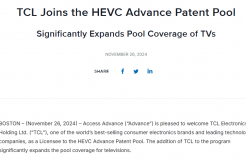Did not receive verification mail? Please confirm whether the mailbox is correct or not Re send mail

IPR Daily
- 2024-02-01 14:34:47
US firms court semiconductor talent amid patent dominance
US firms have been fervently pursuing semiconductor talent in light of clients targeting patents in this area.
Anaqua released a report on January 19, finding that there were 59,662 semiconductor US patent grants last year. While this was slightly down on the 64,035 in 2022, semiconductors was still the most popular field this year.
The other top spots were taken by virtual reality, 5G, artificial intelligence (AI) and unauthorised user detection.

Semiconductors was also the top technology in 2022 and took fifth place in 2021, according to Anaqua.
This importance of semiconductors dovetails with the US government's interest in boosting the industry. Congress passed the CHIPS and Science Act in July 2022 to bolster semiconductor R&D and manufacturing in the US.
Sources who spoke to Managing IP say the data trends line up with what they're seeing from their clients.
James Love, partner at Oblon in Virginia, says his firm is very focused on semiconductors.
“We have semiconductor clients and have been getting new ones and are really just trying to hire people with experience,” he says.
He estimates that Oblon has brought on 10 to 15 people with semiconductor expertise within the past three years.
“We have been investing in it a lot, and it's still an area that we would like to hire people in.”
Ahsan Shaikh, head of the patent prosecution practice group at McDermott Will & Emery in California, says his firm is seeing increased interest in semiconductors from companies that are not traditionally dedicated to this technology.
He notes that this seems to be happening because software companies have found that their devices can be faster with custom chips.
The firm recently added a new member to its practice who has a PhD in electrical engineering. Shaikh says this hire has done some of the most advanced semiconductor work that exists for a Fortune 500 tech company.
The right expertise
Counsel argue that it's important to hire employees with semiconductor backgrounds to do this type of work.
Shaikh at McDermott says that if a software business wants to file a complex semiconductor patent, it needs outside counsel who understand the technology as much as traditional semiconductor companies do.
“A high level of expertise is required,” he says.
Love at Oblon agrees.
“It's one of those areas where having a PhD is a real help. It's not necessary. But a lot of the clients we've been getting more recently have appreciated the depth of technology knowledge that a lot of our people have, especially some of our patent agents and tech advisers.”
There are other ways that firms can meet client demand in this area, however.
Charles Gray, partner at Kilpatrick Townsend in Colorado, says his firm has been training people to work on this tech.
The firm might ask an employee with a different technological background to work closely with an attorney with semiconductor expertise, for example.
But the team is also looking to bring more people on with semiconductor experience.
“We're always looking for good people with semiconductor backgrounds. I don't think that will ever change.
“But I will say, just from my own experience in looking for people with that background, they are hard to find. I think most people are having trouble finding that talent,” he adds.
At least one firm also has recently formed an industry group dedicated to this technology.
T J Clark, partner at Sunstein in Boston, says his firm created a semiconductor and microelectronics industry group in June 2023. It is led by Clark and his partner Shane Hunter.
“We formed the group specifically to help the semiconductor ecosystem with patenting, IP management and trade secret issues, and have been actively marketing that,” he says.
He's also working on helping companies in this sector manage their portfolios and make determinations about what to file on, he adds.
“That's really the focus of the group – to maintain our presence in that market and assist our clients.”
Adapting to AI
Firms have also noticed opportunities in other technologies that Anaqua identified as being popular.
Counsel are trying to tap into work on AI-related patents, for example. But finding people to work on these tends to be a little less complex.
Love at Oblon says people with software expertise can generally prosecute AI-related patents.
“AI is very technical. But most of the patents are not on that level of detail. Most of the patents involve applying AI to different fields.”
Shaikh at McDermott agrees, noting that most of his new meetings involve companies that aren't AI businesses but have an idea about how to use it for their own purposes.
“For those sorts of companies, general software knowledge is fine,” he says.
But he notes that if firms are advising one of the frontier AI labs – like McDermott is – it's important to have AI experts because a general software knowledge won't be sufficient.
Courting countries?
The report also highlighted the top countries of origin for US patents in 2023. The US itself, perhaps unsurprisingly, took the top spot with 162,557 patents.
Japan was second, and China third.

Gray notes that China has been a focus for his firm. He only recently moved back to the US after living and working in Shanghai for the last 11 years.
“We're actively looking for those Chinese companies, and they're upping their filings. I don't see an end coming up for the next few years at least. We're constantly trying to tailor to those clients because they have a lot of need.”
South Korea, Germany and Taiwan took the next top three spots.
Love at Oblon says Taiwan likely makes this list because it has a major semiconductor industry.
“It's an area we're investing in. People from our firm have visited Taiwan several times this year. It's obviously an important area,” he says.
Given the dominance of semiconductor patents, jurisdictions that produce a lot of this technology will likely continue to be worth visiting for law firms.
At least for those that can snag the right talent.
Source:https://www.managingip.com/article/2crktq7exyzuk3jnudaf4/patents/us-firms-court-semiconductor-talent-amid-patent-dominance - Rani Mehta
Editor: Peter
- I also said the two sentence
- Also you can enter 140words
 Heavy Blow: The AMR Imposes a Severe Fine of CNY 160,000 on Trademark Infringer
Heavy Blow: The AMR Imposes a Severe Fine of CNY 160,000 on Trademark Infringer PurpleVine Drives TCL’s Successful Entry into the HEVC Advance Patent Pool
PurpleVine Drives TCL’s Successful Entry into the HEVC Advance Patent Pool Officially Launched! Selection of Asian 40 Intellectual Property In-House
Officially Launched! Selection of Asian 40 Intellectual Property In-House IP Considerations When Expanding Business Overseas – A Singapore Perspective
IP Considerations When Expanding Business Overseas – A Singapore Perspective


